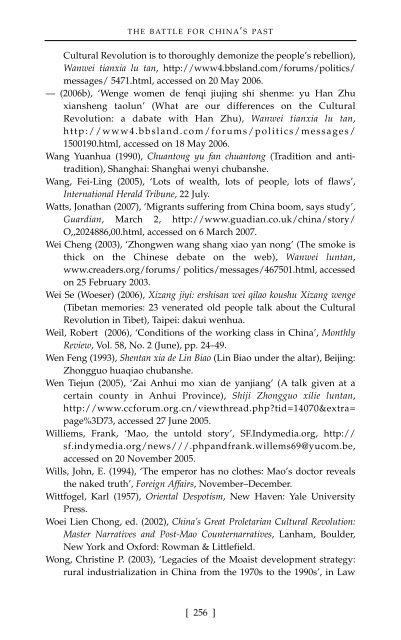Battle for China's Past : Mao and the Cultural Revolution
Battle for China's Past : Mao and the Cultural Revolution
Battle for China's Past : Mao and the Cultural Revolution
Create successful ePaper yourself
Turn your PDF publications into a flip-book with our unique Google optimized e-Paper software.
THE BATTLE FOR CHINA’ S PAST<br />
<strong>Cultural</strong> <strong>Revolution</strong> is to thoroughly demonize <strong>the</strong> people’s rebellion),<br />
Wanwei tianxia lu tan, http://www4.bbsl<strong>and</strong>.com/<strong>for</strong>ums/politics/<br />
messages/ 5471.html, accessed on 20 May 2006.<br />
–– (2006b), ‘Wenge women de fenqi jiujing shi shenme: yu Han Zhu<br />
xiansheng taolun’ (What are our differences on <strong>the</strong> <strong>Cultural</strong><br />
<strong>Revolution</strong>: a dabate with Han Zhu), Wanwei tianxia lu tan,<br />
http://www4.bbsl<strong>and</strong>.com/<strong>for</strong>ums/politics/messages/<br />
1500190.html, accessed on 18 May 2006.<br />
Wang Yuanhua (1990), Chuantong yu fan chuantong (Tradition <strong>and</strong> antitradition),<br />
Shanghai: Shanghai wenyi chubanshe.<br />
Wang, Fei-Ling (2005), ‘Lots of wealth, lots of people, lots of flaws’,<br />
International Herald Tribune, 22 July.<br />
Watts, Jonathan (2007), ‘Migrants suffering from China boom, says study’,<br />
Guardian, March 2, http://www.guadian.co.uk/china/story/<br />
O,,2024886,00.html, accessed on 6 March 2007.<br />
Wei Cheng (2003), ‘Zhongwen wang shang xiao yan nong’ (The smoke is<br />
thick on <strong>the</strong> Chinese debate on <strong>the</strong> web), Wanwei luntan,<br />
www.creaders.org/<strong>for</strong>ums/ politics/messages/467501.html, accessed<br />
on 25 February 2003.<br />
Wei Se (Woeser) (2006), Xizang jiyi: ershisan wei qilao koushu Xizang wenge<br />
(Tibetan memories: 23 venerated old people talk about <strong>the</strong> <strong>Cultural</strong><br />
<strong>Revolution</strong> in Tibet), Taipei: dakui wenhua.<br />
Weil, Robert (2006), ‘Conditions of <strong>the</strong> working class in China’, Monthly<br />
Review, Vol. 58, No. 2 (June), pp. 24–49.<br />
Wen Feng (1993), Shentan xia de Lin Biao (Lin Biao under <strong>the</strong> altar), Beijing:<br />
Zhongguo huaqiao chubanshe.<br />
Wen Tiejun (2005), ‘Zai Anhui mo xian de yanjiang’ (A talk given at a<br />
certain county in Anhui Province), Shiji Zhongguo xilie luntan,<br />
http://www.cc<strong>for</strong>um.org.cn/viewthread.php?tid=14070&extra=<br />
page%3D73, accessed 27 June 2005.<br />
Williems, Frank, ‘<strong>Mao</strong>, <strong>the</strong> untold story’, SF.Indymedia.org, http://<br />
sf.indymedia.org/news///.php<strong>and</strong>frank.willems69@yucom.be,<br />
accessed on 20 November 2005.<br />
Wills, John, E. (1994), ‘The emperor has no clo<strong>the</strong>s: <strong>Mao</strong>’s doctor reveals<br />
<strong>the</strong> naked truth’, Foreign Affairs, November–December.<br />
Wittfogel, Karl (1957), Oriental Despotism, New Haven: Yale University<br />
Press.<br />
Woei Lien Chong, ed. (2002), China’s Great Proletarian <strong>Cultural</strong> <strong>Revolution</strong>:<br />
Master Narratives <strong>and</strong> Post-<strong>Mao</strong> Counternarratives, Lanham, Boulder,<br />
New York <strong>and</strong> Ox<strong>for</strong>d: Rowman & Littlefield.<br />
Wong, Christine P. (2003), ‘Legacies of <strong>the</strong> Moaist development strategy:<br />
rural industrialization in China from <strong>the</strong> 1970s to <strong>the</strong> 1990s’, in Law<br />
[ 256 ]
















